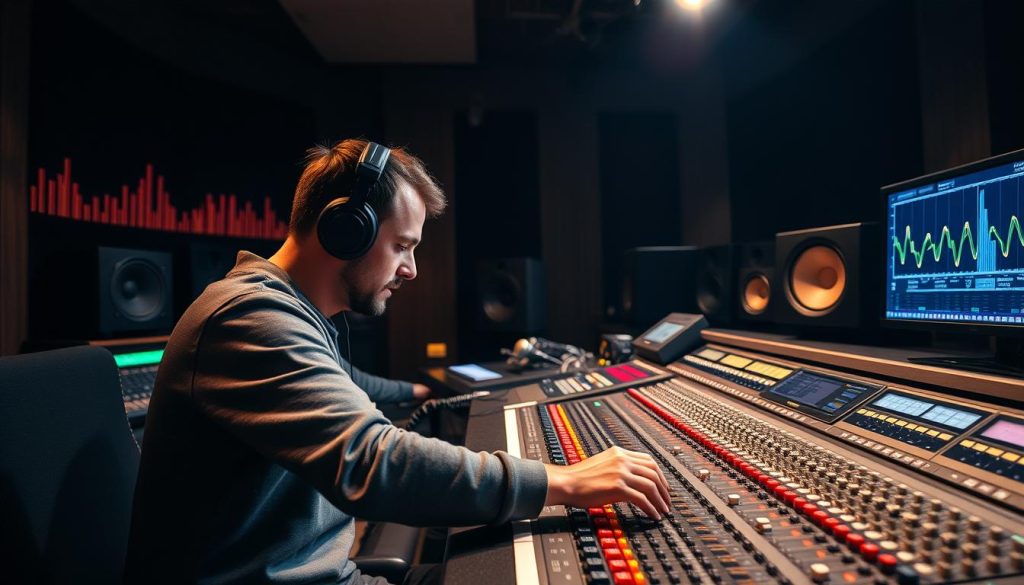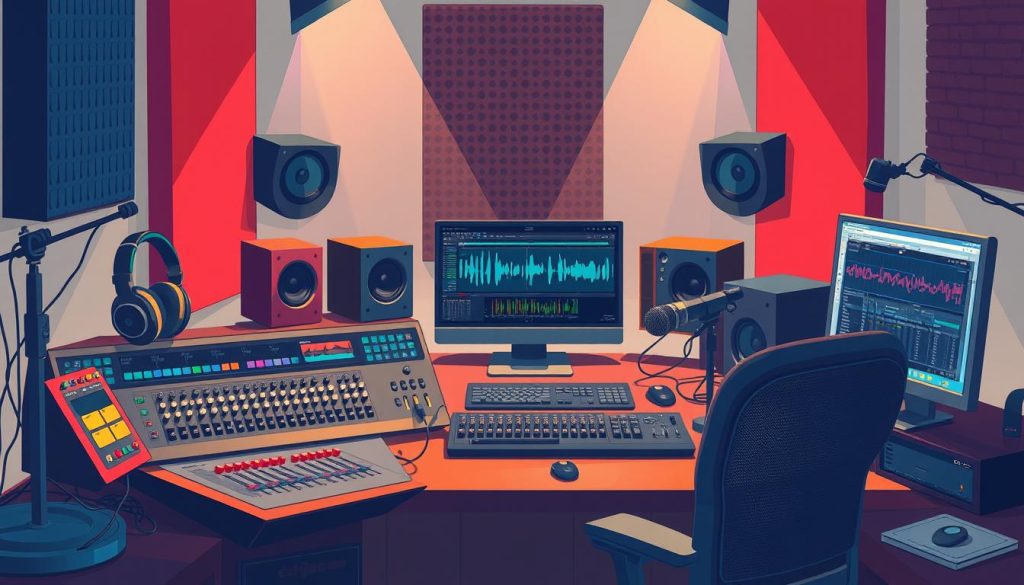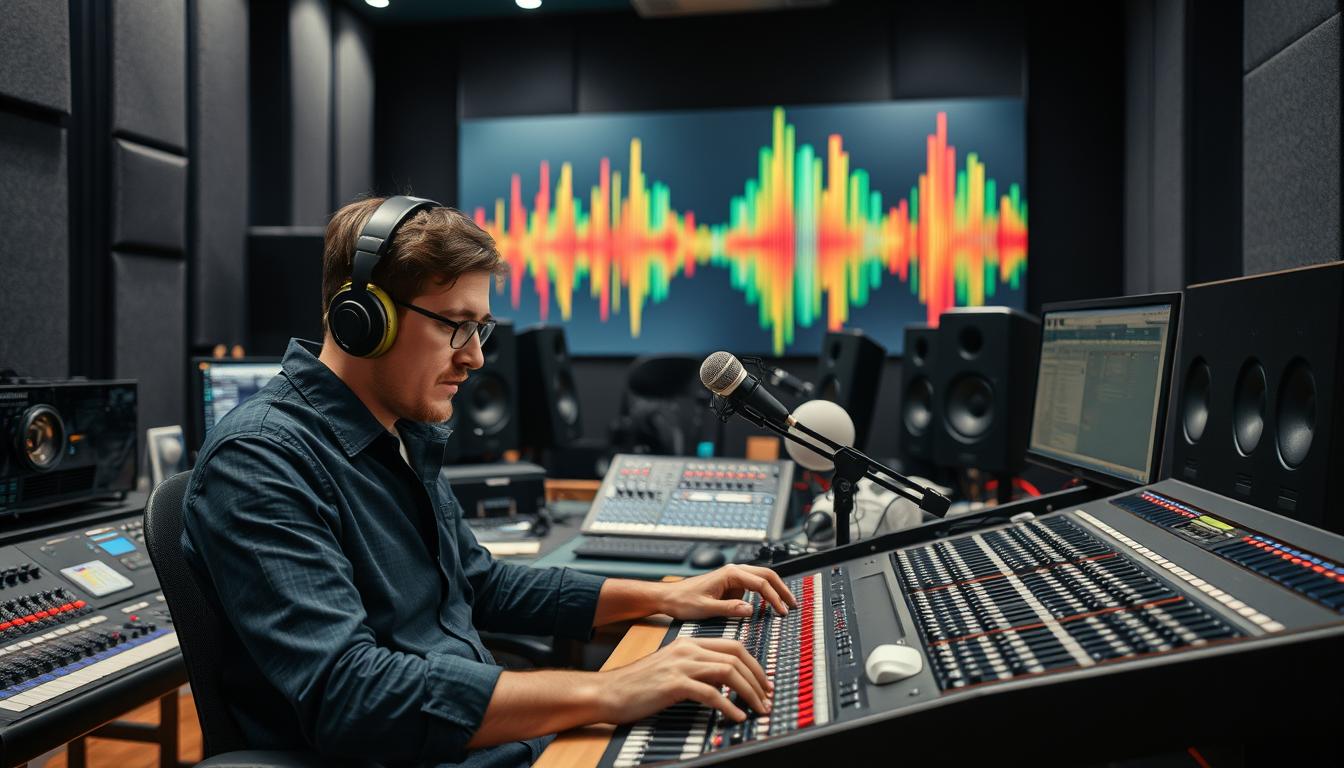I work as a sound engineer in music, film, and live events. My job covers the technical parts of recording, mixing, and playing back sound. I use equipment like microphones, mixers, and sound systems to make sure the sound is top-notch.
I work with artists, producers, and others to get the right sound. I suggest upgrades for equipment and software to improve the audio quality. Whether it’s in a studio, on a movie set, or at a concert, my aim is to give the audience a great sound experience.
I’m proud to shape sound and create the perfect sound environment. My skills let me fix problems, adjust levels, and make the final product perfect. This job needs a mix of art and science knowledge. I love learning and growing in this exciting field.
Introduction to Sound Engineering
Sound engineering is a broad field with many career paths. Each path needs different skills and knowledge. It covers live events, studio recording, and broadcast engineering.
Overview of Sound Engineering Roles
Sound engineers can work in different areas. These include:
- Live sound engineers manage audio systems at events.
- Broadcast engineers keep radio and TV audio equipment running.
- Studio recording engineers work on music and film audio.
Differences Between Audio and Sound Engineers
“Audio engineer” and “sound engineer” are often mixed up. But they’re not the same. Audio engineers work in studios, handling the technical side of sound. Sound engineers work with live performances, making sure the sound is great for the audience.
Knowing the different roles in sound engineering helps people find the right career path. It helps them match their interests and skills with the right job.
Responsibilities of a Sound Engineer
As a sound engineer, I have many important tasks. These tasks are key to making audio projects successful. I start by understanding what the client wants and picking the right gear. Then, I mix and master audio tracks to make them sound great.
Key Tasks and Duties
My main duties include:
- Helping with research to find the best sound and mixing gear
- Mixing and mastering audio to make sure it sounds clear and perfect
- Recording and editing audio to match what the client wants
- Testing microphones and gear to make sure they work well
- Recommending upgrades to improve the sound quality
- Checking and fixing equipment to keep it running smoothly
Setting Up and Managing Audio Equipment
Setting up and managing audio gear is a big part of my job. This means:
- Unpacking, checking, and setting up all the sound and mixing gear
- Making sure the gear is set up right for the best sound
- Watching how the gear performs and adjusting it as needed
- Packing up and storing the gear safely after the project
I work hard to give my clients top-notch audio quality and a smooth production process.
what does a sound engineer do

Recording, Editing, and Mixing Audio
As a sound engineer, I focus on the technical parts of recording, editing, and mixing. I use special software and gear to make and improve audio tracks. This makes sure the final sound is top-notch.
I set up microphones, adjust levels, and add effects to the recordings. This work makes the sound better.
Live Event Sound Management
At live events, I set up and manage the sound system. My job is to make sure the audience hears the music and vocals clearly. I solve any technical problems fast.
My aim is to use my skills to give the best sound experience. Whether it’s in a studio or at a live event, I work hard. I handle sound engineer recording duties, sound engineer mixing responsibilities, and live sound engineering. My goal is to make sure the audio is amazing every time.
Essential Skills for Sound Engineers

Being a sound engineer means you need special skills. You must know a lot about audio engineering and how to talk to people. A good sound engineer knows many things.
Technical Expertise and Auditory Skills
Sound engineers need to understand audio gear and software well. They must know how to use mixing boards, mics, speakers, and digital tools. They also need to hear sounds very well and fix audio problems.
- Expertise in setting up, maintaining, and troubleshooting sound equipment
- Proficiency in audio recording, editing, and mixing techniques
- Exceptional hearing capabilities to detect subtle nuances in sound
- Ability to analyze and manipulate audio signals to achieve desired outcomes
Communication and Interpersonal Abilities
Sound engineers work with artists, producers, and others to make great music. They need to talk and write well. They must work together, understand what clients want, and explain complex ideas simply.
- Strong interpersonal skills to build rapport with clients and colleagues
- Ability to listen actively and provide constructive feedback
- Effective problem-solving and conflict resolution skills
- Adaptability and the capacity to work well under pressure
By using technical skills, great hearing, and good communication, sound engineers are key in the music and event industries.
Educational Background and Training
To start a career as a sound engineer, you can get formal education in audio engineering or sound production. These programs offer diplomas and degrees. They teach the technical and creative skills needed for success.
Formal Degree Programs in Audio Engineering
Audio engineering degree programs have a wide curriculum. They cover recording, mixing, mastering, live sound, and audio system design. Students get a strong base in sound engineering’s science and art. This prepares them for many roles in the industry.
- Audio engineering diplomas: These are shorter programs. They focus on hands-on training and technical skills. Students get practical experience quickly.
- Associate’s degrees in audio engineering: These two-year programs go deeper into sound engineering. They prepare students for entry-level jobs.
- Bachelor’s degrees in audio engineering: These four-year programs offer a full education. They cover advanced topics like audio production, acoustics, and audio system design. Graduates are ready for many roles in the field.
Some sound engineers learn on their own. They use hands-on experience and a portfolio to show their skills. They improve through internships, personal projects, and ongoing learning. This keeps them current with industry trends and tech.
Career Opportunities and Salary Prospects
As a sound engineer, I can work in many places. These include recording studios, live events, and video game studios. The average salary is about $109,600 a year.
Entry-level jobs start at $48,100. Experienced sound engineers can earn up to $249,700.
Freelancers like me can earn $40 to $96 an hour. This depends on our skills and the project type. It lets us choose our work, from big studio projects to local events.
This job offers great pay and many opportunities. It’s perfect for those who love audio technology and have a good ear for sound. By improving my skills and keeping up with trends, I can have a successful career in this exciting field.

